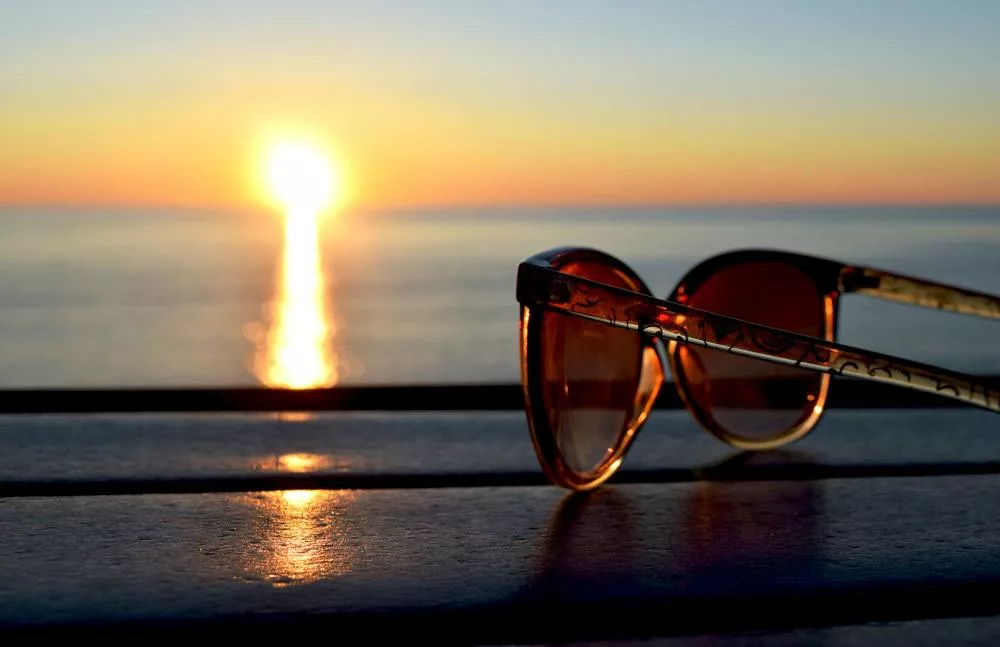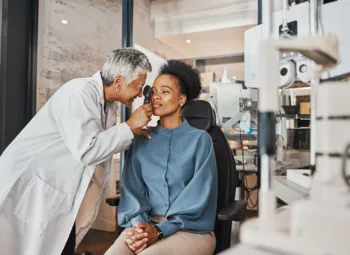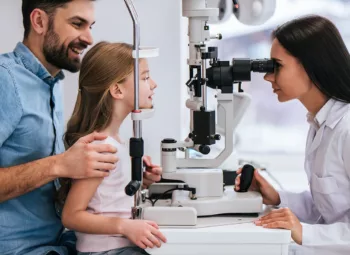
Just like you would apply sunscreen to your skin during a day at the beach, so too should you be wearing sunglasses for vision protection during prolonged outdoor activities. Overexposure to the sun’s ultraviolet light can cause damage to the sensitive cells found within the eyes. While it is still difficult to determine the exact level of damage UV light causes, studies are showing that the effects of UV damage can build up and increase over time. Lengthy exposure to the sun’s ultraviolet light has been linked to various vision-related conditions including macular degeneration, cataracts, and pterygium.
How Ultraviolet Light Damages Eyes
There are two categories of ultraviolet light that have been identified as damaging to eye health:
- UV-A Effects central vision. Can cause damage to the macula, part of the retina, located at the rear of your eye.
- UV-B Effects the cornea and lens. Linked to corneal problems and distorted vision.
Macular Degeneration
The macula is found at the center of the retina and is important for clear and accurate vision. The lens of the eye typically filters out much the damaging UV radiation before it is able to reach the retina and macula. But over time UV radiation can damage both the retina and macula, causing Macular Degeneration, resulting in vision loss and conditions such as farsightedness.
Cataracts
Studies have shown that UV-B radiation can be directly linked to Cataract development. A cataract occurs when the eyes’ natural lens becomes clouded by altered cells within the lens. Overexposure to UV radiation can increase the risk of cataract development.
Pterygium
A UV radiation-related problem, Pterygium causes a small growth on the white of the eye. The condition is associated with lengthy exposure to sunlight. Common among people involved in water or snow activities due to the nature of water and snow reflecting UV radiation off of their surfaces. Symptoms include dry or itchy eyes, tearing, and the sensation of a foreign object in the eye.
Photokeratitis
The result of high levels of UV-B radiation. Essentially a sunburn on the cornea. Caused by excessive exposure to UV light from the sun and even tanning beds. The cornea reflects light inside of the eye towards the retina. Lengthy trips to the beach or time spent in the snow without eye protection can cause photokeratitis resulting in painful temporary vision loss.
Proactive Vision Protection from Sun Damage with Sunglasses
Knowing the dangers posed by ultraviolet radiation is a big first step. You are exposed to UV rays when in direct sunlight and UV rays can also reflect from water, snow, and other bright reflective surfaces.
That said, it is important to take precautions and wear proper eye protection that can mitigate harmful UV radiation. Be proactive in your vision protection during prolonged outdoor activities from overexposure to ultraviolet light with quality UV light sunglasses:
- UV-A and UV-B blocking sunglasses
- UV blocking goggles when swimming or skiing
- Wide-brimmed hats
- Avoid tanning beds
- Avoid prolonged sun exposure during peak hours – 10 am to 4 pm
Sunglasses should be worn when you plan to be out in the sun. Eyewear that provides UV absorption and reflection will provide you with the most protection and can be achieved through a variety of UV blocking lens materials and coatings.
Different colored or tinted lenses can filter and block specific UV light that is harmful to your vision. Also, polarized and reflective coatings can reduce glare and block UV radiation both directly and when they themselves are reflecting off of surfaces such as water or roadways.
Not all sunglasses are created equally…
Adequate protection requires sunglasses to provide a minimum of 98% UV protection. Cheap or novelty sunglasses just don’t cut it and can even put your eyes at greater risk than going without sunglasses altogether. This is because sunglasses with a dark tint but no UV protection will bring you a false sense of safety, allowing UV radiation into your eyes while you think you are protected.
NeoVision in Union City is Your Vision Protection Ally
Sunglasses can be as functional as they are fashionable. When choosing your sunglasses you should consider both vision protection and comfort. Your lifestyle and personal preferences must come into play as well and the skilled ophthalmologists at NeoVision Eye Center can help you choose the right protection for you.
NeoVision offers a wide variety of popular brands and styles to choose from, both prescription and non-prescription. We can even change most pairs of sunglasses into prescription sunglasses. Stop by or contact us online today to learn what a quality pair of sunglasses can do for your eyes and overall vision protection approach.





